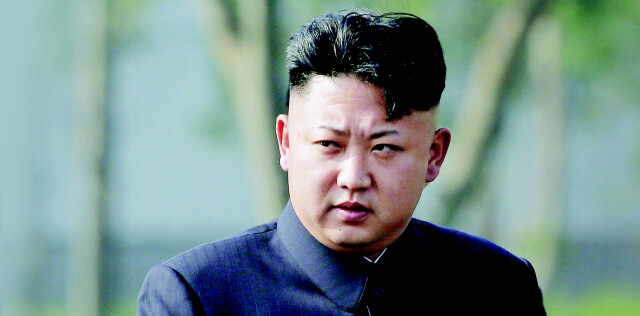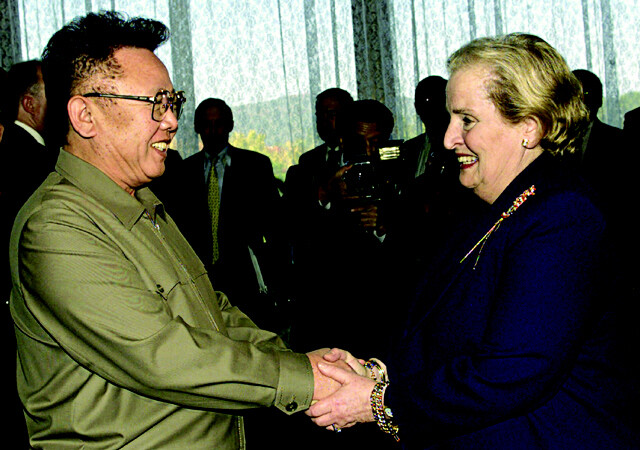hankyoreh
Links to other country sites 다른 나라 사이트 링크
[Kim Jong-un’s Hypothetical Letter 5-2] “I don’t want to be a Gaddafi or Hussein”

If Clinton had come to Pyongyang in 2000
While the US is frustrated that it can’t gobble up North Korea, not all American presidents are the same. Bill Clinton in particular was quite different from George W. Bush.
In Oct. 2000, the late Vice Marshal Jo Myong-rok traveled to Washington, D.C., on a visit that resulted in the US-DPRK Joint Communique. Here’s its key passage: “In this regard, the two sides agreed there are a variety of available means, including Four Party talks, to reduce tension on the Korean Peninsula and formally end the Korean War by replacing the 1953 Armistice Agreement with permanent peace arrangements. [. . .] As a crucial first step, the two sides stated that neither government would have hostile intent toward the other and confirmed the commitment of both governments to make every effort in the future to build a new relationship free from past enmity.”

So Madeleine Albright, who was the US Secretary of State at the time, came to Pyongyang to prepare for a summit between North Korea and the US. The South Korean government, under President Kim Dae-jung, made a great effort to bring us to that point. Experts believe that the Perry Process, a plan devised by the US and South Korea to bring peace to the Korean Peninsula, was a stepping stone on the way to achieving the first ever inter-Korean summit meeting and pushing for a summit meeting between North Korea and the US.
The Perry Process was a comprehensive approach to bringing about peace by dismantling the Cold War regime in place on the Korean Peninsula. The Cold War regime was defined by Lim Dong-won (who served as Blue House Senior Secretary for Foreign Affairs and Security, Minister of Unification and Director of the National Intelligence Service during the Kim Dae-jung administration) as being composed of six factors: ① distrust and strife between North and South Korea, ② the hostile relationship between the US and North Korea, ③ North Korea’s tendency to be closed off and inflexible, ④ weapons of mass destruction (nuclear weapons, long-range missiles, and biological and chemical weapons), ⑤ the military standoff and the arms race and ⑥ the armistice regime.
(Source: Lim Dong-won, Peacemaker, revised and expanded edition, p. 308)
People have this idea that North Korea is unusually uncooperative, but that’s actually a misconception. It’s rare for us to spurn a country that offers its hand to us in sincerity. We may stick out our spikes like a hedgehog in order to defend ourselves against the American menace, but the long years of hostility and isolation have left us lonely and afraid. As you’re well aware, we don’t have a lot of friends. Why would we turn away someone who wanted to be our friend?
But the Florida recount handed the presidency to George W. Bush, and Clinton never was able to come to Pyongyang. If Clinton had made that trip, the situation in North Korea wouldn’t be the way it is today.
But that’s not all. George W. Bush linked North Korea with Iran and Iraq as part of what he called the “axis of evil.” We were worried about what Bush meant to do with us.
Next thing you know, Bush invaded Iraq, even without the authorization of the UN Security Council. Then Iraqi President Saddam Hussein—the same guy who had fought an eight-year proxy war for the US with its enemy Iran (from Sep. 1980 to Aug. 1988)—was arrested in 2003 and his execution carried out in 2006. If Hussein had managed to acquire nuclear deterrence, would Bush have behaved so savagely?
While we’re on the topic, let’s talk about Libya’s Muammar Gaddafi. In Dec. 2003, Gaddafi shut down his nuclear weapons development program, believing American promises about lifting economic sanctions and normalizing diplomatic relations.
But what happened after that? On Oct. 20, 2011, Gaddafi was shot to death in his hometown of Sirte by US-backed rebel soldiers. If he hadn’t fallen for the US’s scheme—if he hadn’t given up his development of nuclear weapons—would he have died such a horrible death? Needless to say, my father hadn’t the slightest desire of ending up like a Korean version of Gaddafi.
Seeing Hussein and Gaddafi’s belief in the US lead to the downfall of their countries and the loss of their lives, we North Koreans learned one clear lesson. I’ll take a closer look at this later, but this was one of the main reasons I settled on the “parallel development policy” of economic development and nuclear armament.
North Korea officially adopted this policy during a plenary session of the WPK Central Committee on Mar. 31, 2013. “We must never forget the lesson of the countries in the Middle East,” I emphasized during the session, “countries that failed to resist the pressure and enticements of the imperialists to give up the military deterrence that they already had and, in the end, became victims of aggression.”
I know, I know—you’d describe the situation differently. You’d say that Hussein and Gaddafi weren’t driven from power and brought to a terrible end because they lacked nuclear deterrence, but because they were dictators.
But is that really true? There are countless dictators in the world, but the US hasn’t removed them all from power. Just take a look at the recent history of Latin America. The US was there, propping up every dictatorship.
And did the lives of the people of Iraq and Libya improve after Hussein and Gaddafi were killed? Iraq is in the tenth year of a civil war, and Libya is a mess, too. When order collapses, it’s the weak common people who are the first to feel the pain.
You might say that my argument isn’t convincing since there are tons of prosperous countries that don’t have nukes. You’ve got a point there.
But you’ve got to take North Korea’s situation into account. We’re a weak, small and isolated country that the US has been blockading for nearly 70 years. Our sense of being surrounded and our obsession with the national defense are written in our DNA: history has drilled them into us.
Do you know what my grandfather said when Qian Qichen, the Chinese Foreign Minister at the time, came to Pyongyang in 1992 to say that China would be following Russia’s lead to establish diplomatic relations with South Korea? “If we run into any trouble, we’ll deal with it ourselves.”
(Source: Zhang Tingyan, China’s first ambassador to South Korea, Ambassador to South Korea)
By Lee Je-hun, staff reporter
Please direct questions or comments to [english@hani.co.kr]
To be continued...

Editorial・opinion
![[Column] Park Geun-hye déjà vu in Yoon Suk-yeol [Column] Park Geun-hye déjà vu in Yoon Suk-yeol](https://flexible.img.hani.co.kr/flexible/normal/500/300/imgdb/original/2024/0424/651713945113788.jpg) [Column] Park Geun-hye déjà vu in Yoon Suk-yeol
[Column] Park Geun-hye déjà vu in Yoon Suk-yeol![[Editorial] New weight of N. Korea’s nuclear threats makes dialogue all the more urgent [Editorial] New weight of N. Korea’s nuclear threats makes dialogue all the more urgent](https://flexible.img.hani.co.kr/flexible/normal/500/300/imgdb/original/2024/0424/7317139454662664.jpg) [Editorial] New weight of N. Korea’s nuclear threats makes dialogue all the more urgent
[Editorial] New weight of N. Korea’s nuclear threats makes dialogue all the more urgent- [Guest essay] The real reason Korea’s new right wants to dub Rhee a founding father
- [Column] ‘Choson’: Is it time we start referring to N. Korea in its own terms?
- [Editorial] Japan’s rewriting of history with Korea has gone too far
- [Column] The president’s questionable capacity for dialogue
- [Column] Are chaebol firms just pizza pies for families to divvy up as they please?
- [Column] Has Korea, too, crossed the Rubicon on China?
- [Correspondent’s column] In Japan’s alliance with US, echoes of its past alliances with UK
- [Editorial] Does Yoon think the Korean public is wrong?
Most viewed articles
- 1‘We must say no’: Seoul defense chief on Korean, USFK involvement in hypothetical Taiwan crisis
- 2N. Korean delegation’s trip to Iran shows how Pyongyang is leveraging ties with Moscow
- 3‘Weddingflation’ breaks the bank for Korean couples-to-be
- 4[Reportage] On US campuses, student risk arrest as they call for divestment from Israel
- 5Amnesty notes ‘erosion’ of freedom of expression in Korea in annual human rights report
- 6[Column] Park Geun-hye déjà vu in Yoon Suk-yeol
- 7Korea sees more deaths than births for 52nd consecutive month in February
- 8[Editorial] New weight of N. Korea’s nuclear threats makes dialogue all the more urgent
- 9Will NewJeans end up collateral damage in internal feud at K-pop juggernaut Hybe?
- 10[Guest essay] The real reason Korea’s new right wants to dub Rhee a founding father